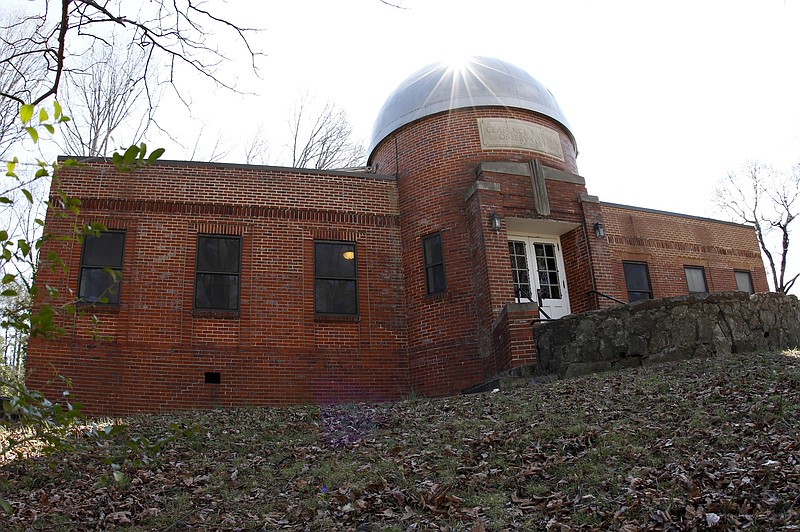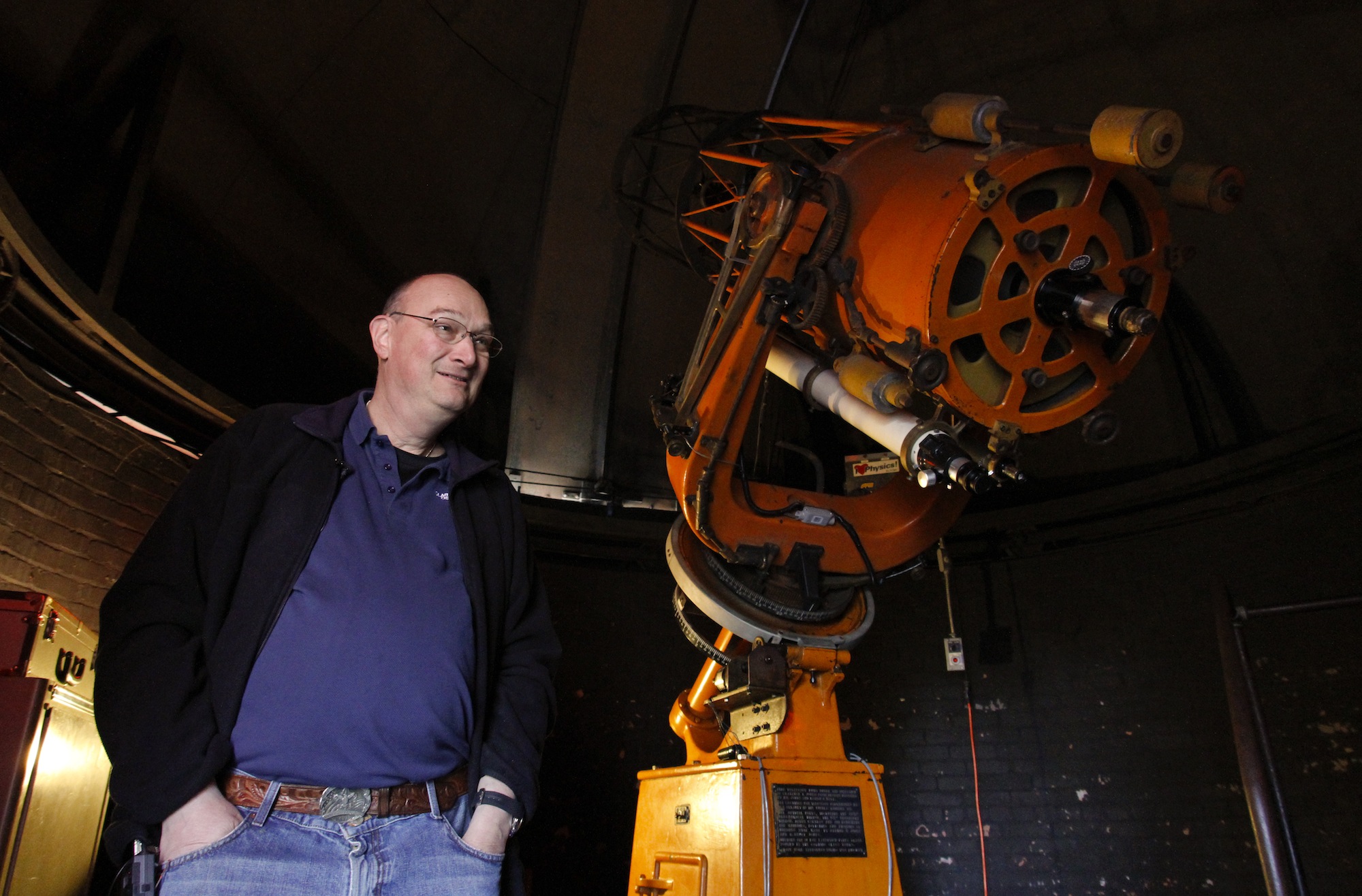If you go
› What: Spring astronomy series› When: Most Sundays through April; gates open at 5:30 p.m. the first seven Sundays; 6:30 p.m. after the change to daylight-saving time› Where: Clarence T. Jones Observatory, 10 Tuxedo Ave.› Admission: Free› Phone: 423-425-4518› Email: jack-pitkin@utc.edu› Website: www.utc.edu/physics-astronomy/observatory
Note on entering
Those who may have trouble walking the path to the Jones Observatory’s front entrance may park in the lot behind Brainerd United Methodist Church, 4315 Brainerd Road. An easier trail by the cemetery leads to the back entrance.
If all you know about space comes from storylines on "The Big Bang Theory," you think of Pluto only as Mickey Mouse's dog and Taurus as a car your mom drives, it might be time for a few astronomy lessons.
Jack Pitkin can help. He's the man in charge of UTC's Clarence T. Jones Observatory in Brainerd, and he's set to begin a new series of planetarium shows on Sunday, Jan. 24.
In 11 sessions through April (with a three-week break in March), he'll explain some of the latest news in space, point out which constellations are overhead and generally "demystify" the Milky Way.
"Some people are really intimidated by all this," he says. "There's no reason to be."
Pitkin's programs - which explain everything from sand dunes on Mars to the big red spot on Jupiter - are suited to all ages and levels of interest. The demographics vary "all over the darned place," he says.
"Some weeks we get Cub Scouts, and some weeks mostly senior citizens. Some weeks we get both. We get parents that bring their kids and kids that drag their parents."
The schedule typically repeats program topics for two weeks, but they're never exactly the same and often there are nuggets of news to share with the crowd. Even if the topic is familiar, the night sky is a giant source of unfolding attractions.
"We find that a lot of people come pretty much every time the doors open," he says.
One change Pitkin is making this season is having the option for more than one lecture. Delivering the talking points a second time will give stragglers a chance to hear the complete discussion rather than just the tail end of the talk, he says. Even if he's busy with a second program, student helpers from UTC's Physics and Astronomy Department are on hand to get the early arrivals started on their star-gazing.
The observatory's main telescope is a 20.5-inch Cassegrain, and on good nights portable Dobsonian telescopes are available as well.
A good night, Pitkin says, is a clear night. Last semester, programs were offered as scheduled, but the telescopes were usable only once because of bad weather.
"Sometimes we're looking at the telescopes instead of through them," he says. "An optical telescope is useless when it's cloudy."
Even if clouds and rain won't deter Pitkin's planetary pursuits, the frozen kind of precipitation will.
"We're 'no go' in snow," he says.
Contact Lisa Denton at ldenton@timesfreepress.com or 423-757-6281.
JONES OBSERVATORY SPRING SCHEDULE
Note: The schedule breaks for three weeks in March, first for the two Sundays bookending UTC's spring break, the next week for Easter Sunday. The change to daylight-saving time affects starting times when programs resume in April.
Sunday, Jan. 24
' Topic: "The Latest From Pluto"
' Featured constellation: The Pleiades
' Timetable: Gates open at 5:30 p.m. Lecture and planetarium show at 6 p.m. Telescope viewing until 8 p.m.
Sunday, Jan. 31
* Topic: "The Latest From Pluto"
* Featured constellation: Taurus
* Timetable: Gates open at 5:30 p.m. Lecture and planetarium show at 6 p.m. Telescope viewing until 8 p.m.
Sunday, Feb. 7
* Topic: "Brown Dwarfs"
* Featured constellation: Taurus
* Timetable: Gates open at 5:30 p.m. Lecture and planetarium show at 6 p.m. Telescope viewing until 8 p.m.
Sunday, Feb. 14
* Topic: "Brown Dwarfs"
* Featured constellation: Gemini
* Timetable: Gates open at 5:30 p.m. Lecture and planetarium show at 6 p.m. Telescope viewing until 8 p.m.
Sunday, Feb. 21
* Topic: "The Latest From Mars"
* Featured constellation: Gemini
* Timetable: Gates open at 5:30 p.m. Lecture and planetarium show at 6 p.m. Telescope viewing until 8 p.m.
Sunday, Feb. 28
* Topic: "The Latest From Mars"
* Featured constellation: Orion
* Timetable: Gates open at 5:30 p.m. Lecture and planetarium show at 6 p.m. Telescope viewing until 8 p.m.
Sunday, March 6
* Topic: "The Moons of Jupiter"
* Featured constellation: Orion
* Timetable: Gates open at 5:30. Lecture and planetarium show at 7 p.m. Telescope viewing until 8 p.m.
Sunday, April 3
* Topic: "The Moons of Jupiter"
* Featured constellation: Leo
* Timetable: Gates open at 6:30. Lecture and planetarium show at 7 p.m. Telescope viewing until 9 p.m.
Sunday, April 10
* Topic: "The Big Red Spot"
* Featured constellations: The Summer Triangle
* Timetable: Gates open at 6:30 p.m. Lecture and planetarium show at 7 p.m. Telescope viewing until 9 p.m.
Sunday, April 17
* Topic: "The Big Red Spot"
* Featured constellations: The Summer Triangle
* Timetable: Gates open at 6:30 p.m. Lecture and planetarium show at 7 p.m. Telescope viewing until 9 p.m.
Sunday, April 24
* Topic: "Radio Astronomy"
* Featured constellations: The Summer Triangle
* Timetable: Gates open at 6:30 p.m. Lecture and planetarium show at 7 p.m. Telescope viewing until 9 p.m.


